LST5CCL - Company Law: Analyzing Consumer Rights and Liabilities
VerifiedAdded on 2023/06/12
|6
|1359
|297
Case Study
AI Summary
This case study examines consumer rights and manufacturer liabilities under Australian Company Law, specifically focusing on the Australian Consumer Law (ACL). It analyzes scenarios where a consumer, Jocelyn, suffers harm after consuming melons purchased from R’Us, highlighting breaches of consumer guarantees related to acceptable quality and safety. The study discusses Jocelyn's entitlement to consequential damages for hospital bills and lost income, referencing relevant sections of the ACL and case law. It further explores Arjun's illness from the same melons, attributing liability to R’Us as manufacturers of defective goods under ACL section 9 and 138. The analysis extends to potential negligence claims and breaches of implied contract terms, emphasizing R’Us' responsibility to compensate for foreseeable losses. The document concludes by referencing key legal cases and ACL provisions supporting the arguments presented.
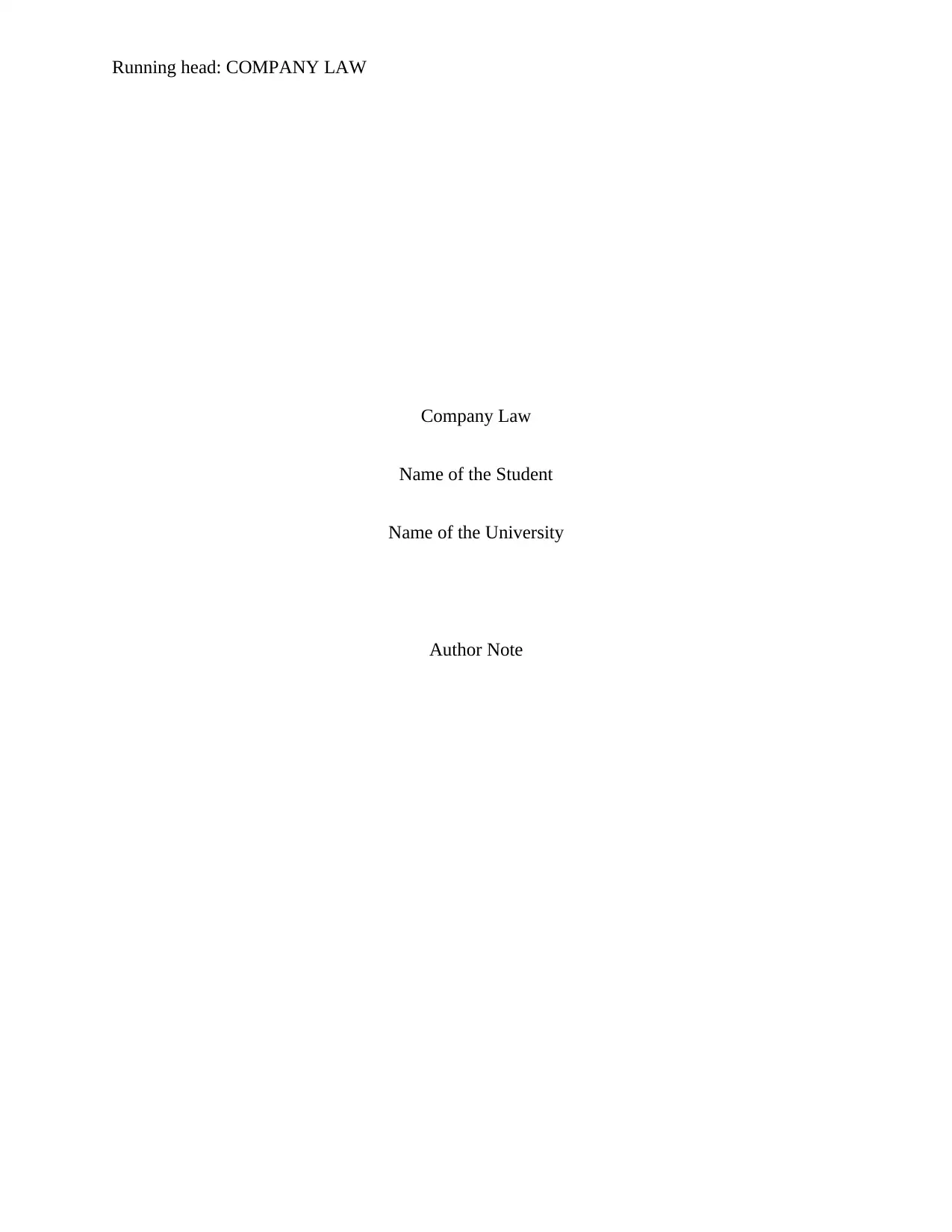
Running head: COMPANY LAW
Company Law
Name of the Student
Name of the University
Author Note
Company Law
Name of the Student
Name of the University
Author Note
Paraphrase This Document
Need a fresh take? Get an instant paraphrase of this document with our AI Paraphraser
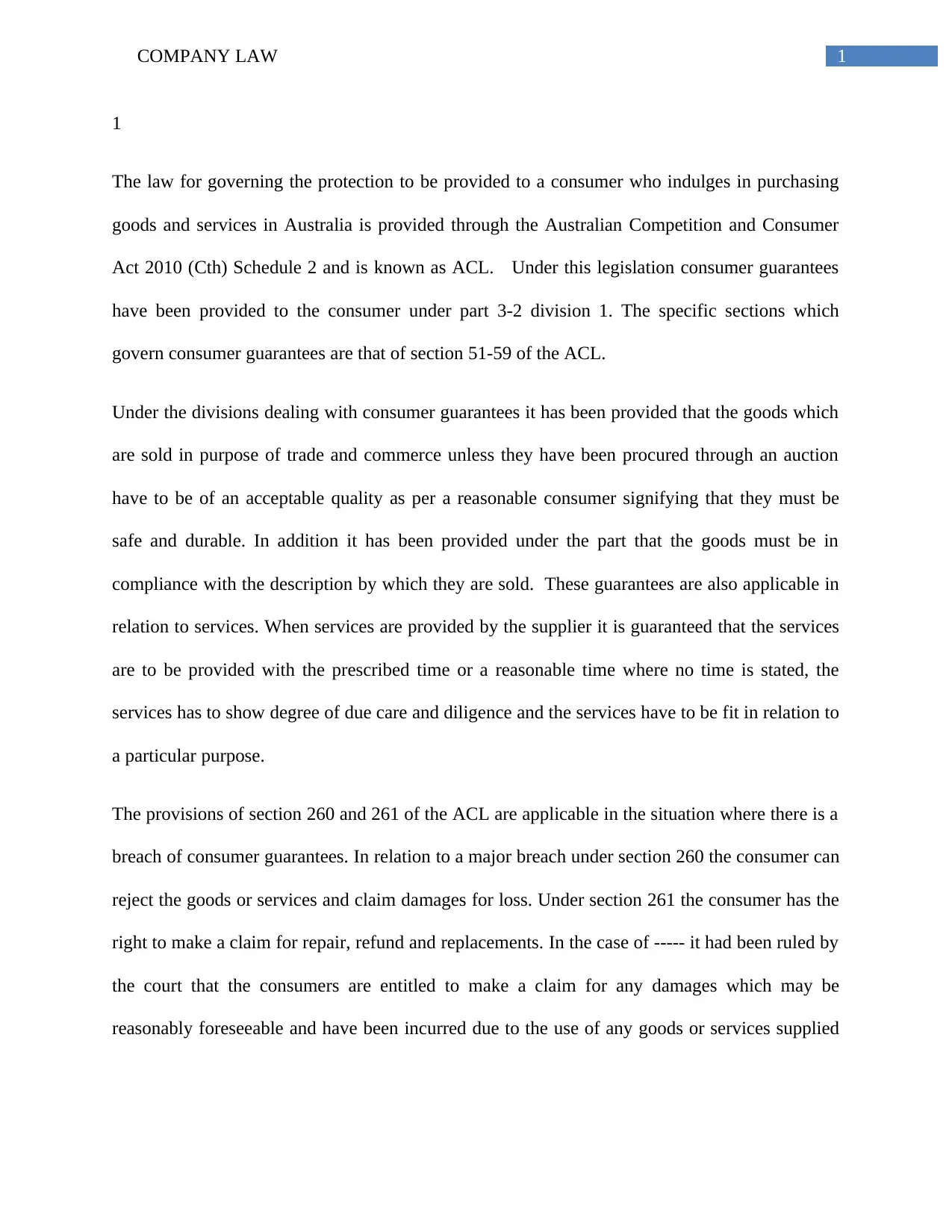
1COMPANY LAW
1
The law for governing the protection to be provided to a consumer who indulges in purchasing
goods and services in Australia is provided through the Australian Competition and Consumer
Act 2010 (Cth) Schedule 2 and is known as ACL. Under this legislation consumer guarantees
have been provided to the consumer under part 3-2 division 1. The specific sections which
govern consumer guarantees are that of section 51-59 of the ACL.
Under the divisions dealing with consumer guarantees it has been provided that the goods which
are sold in purpose of trade and commerce unless they have been procured through an auction
have to be of an acceptable quality as per a reasonable consumer signifying that they must be
safe and durable. In addition it has been provided under the part that the goods must be in
compliance with the description by which they are sold. These guarantees are also applicable in
relation to services. When services are provided by the supplier it is guaranteed that the services
are to be provided with the prescribed time or a reasonable time where no time is stated, the
services has to show degree of due care and diligence and the services have to be fit in relation to
a particular purpose.
The provisions of section 260 and 261 of the ACL are applicable in the situation where there is a
breach of consumer guarantees. In relation to a major breach under section 260 the consumer can
reject the goods or services and claim damages for loss. Under section 261 the consumer has the
right to make a claim for repair, refund and replacements. In the case of ----- it had been ruled by
the court that the consumers are entitled to make a claim for any damages which may be
reasonably foreseeable and have been incurred due to the use of any goods or services supplied
1
The law for governing the protection to be provided to a consumer who indulges in purchasing
goods and services in Australia is provided through the Australian Competition and Consumer
Act 2010 (Cth) Schedule 2 and is known as ACL. Under this legislation consumer guarantees
have been provided to the consumer under part 3-2 division 1. The specific sections which
govern consumer guarantees are that of section 51-59 of the ACL.
Under the divisions dealing with consumer guarantees it has been provided that the goods which
are sold in purpose of trade and commerce unless they have been procured through an auction
have to be of an acceptable quality as per a reasonable consumer signifying that they must be
safe and durable. In addition it has been provided under the part that the goods must be in
compliance with the description by which they are sold. These guarantees are also applicable in
relation to services. When services are provided by the supplier it is guaranteed that the services
are to be provided with the prescribed time or a reasonable time where no time is stated, the
services has to show degree of due care and diligence and the services have to be fit in relation to
a particular purpose.
The provisions of section 260 and 261 of the ACL are applicable in the situation where there is a
breach of consumer guarantees. In relation to a major breach under section 260 the consumer can
reject the goods or services and claim damages for loss. Under section 261 the consumer has the
right to make a claim for repair, refund and replacements. In the case of ----- it had been ruled by
the court that the consumers are entitled to make a claim for any damages which may be
reasonably foreseeable and have been incurred due to the use of any goods or services supplied
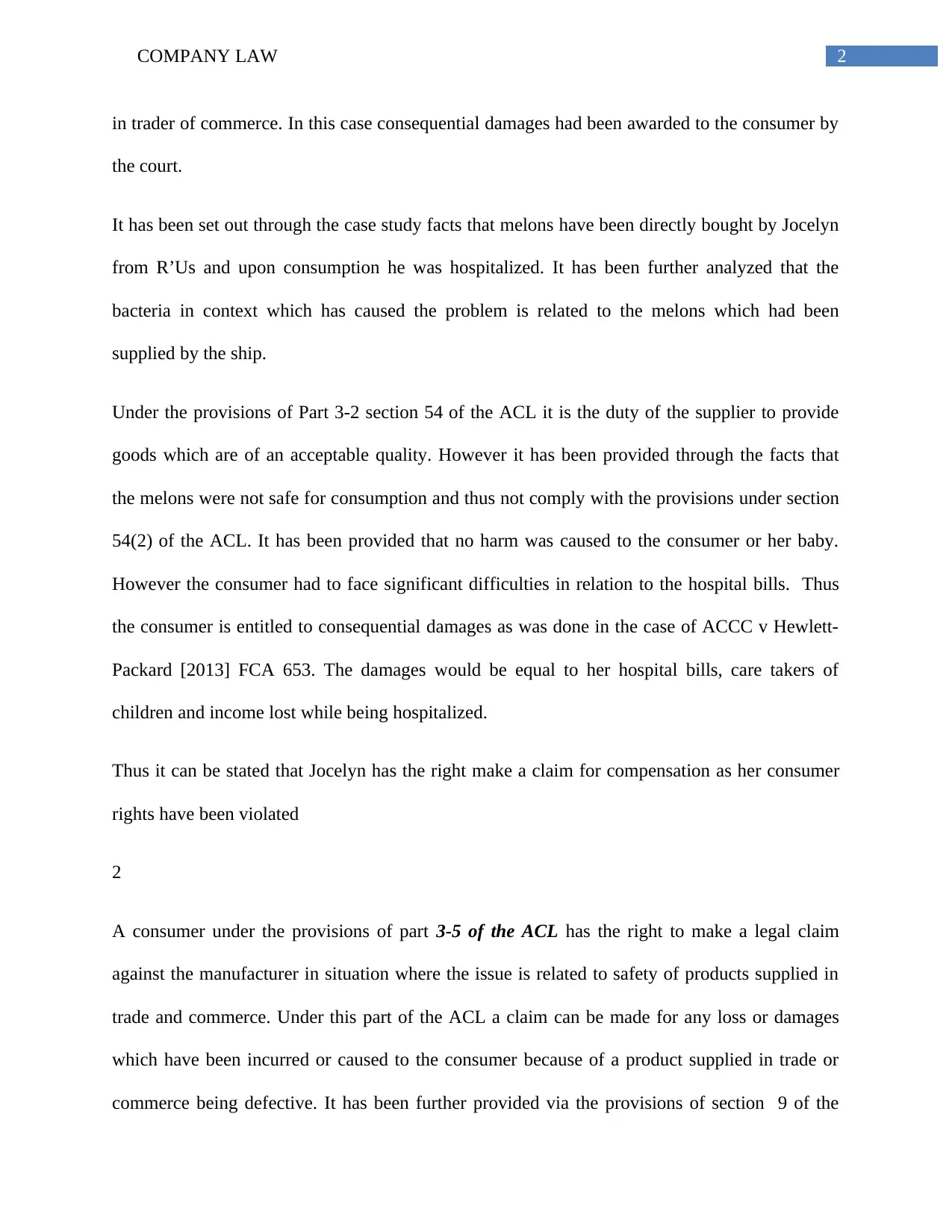
2COMPANY LAW
in trader of commerce. In this case consequential damages had been awarded to the consumer by
the court.
It has been set out through the case study facts that melons have been directly bought by Jocelyn
from R’Us and upon consumption he was hospitalized. It has been further analyzed that the
bacteria in context which has caused the problem is related to the melons which had been
supplied by the ship.
Under the provisions of Part 3-2 section 54 of the ACL it is the duty of the supplier to provide
goods which are of an acceptable quality. However it has been provided through the facts that
the melons were not safe for consumption and thus not comply with the provisions under section
54(2) of the ACL. It has been provided that no harm was caused to the consumer or her baby.
However the consumer had to face significant difficulties in relation to the hospital bills. Thus
the consumer is entitled to consequential damages as was done in the case of ACCC v Hewlett-
Packard [2013] FCA 653. The damages would be equal to her hospital bills, care takers of
children and income lost while being hospitalized.
Thus it can be stated that Jocelyn has the right make a claim for compensation as her consumer
rights have been violated
2
A consumer under the provisions of part 3-5 of the ACL has the right to make a legal claim
against the manufacturer in situation where the issue is related to safety of products supplied in
trade and commerce. Under this part of the ACL a claim can be made for any loss or damages
which have been incurred or caused to the consumer because of a product supplied in trade or
commerce being defective. It has been further provided via the provisions of section 9 of the
in trader of commerce. In this case consequential damages had been awarded to the consumer by
the court.
It has been set out through the case study facts that melons have been directly bought by Jocelyn
from R’Us and upon consumption he was hospitalized. It has been further analyzed that the
bacteria in context which has caused the problem is related to the melons which had been
supplied by the ship.
Under the provisions of Part 3-2 section 54 of the ACL it is the duty of the supplier to provide
goods which are of an acceptable quality. However it has been provided through the facts that
the melons were not safe for consumption and thus not comply with the provisions under section
54(2) of the ACL. It has been provided that no harm was caused to the consumer or her baby.
However the consumer had to face significant difficulties in relation to the hospital bills. Thus
the consumer is entitled to consequential damages as was done in the case of ACCC v Hewlett-
Packard [2013] FCA 653. The damages would be equal to her hospital bills, care takers of
children and income lost while being hospitalized.
Thus it can be stated that Jocelyn has the right make a claim for compensation as her consumer
rights have been violated
2
A consumer under the provisions of part 3-5 of the ACL has the right to make a legal claim
against the manufacturer in situation where the issue is related to safety of products supplied in
trade and commerce. Under this part of the ACL a claim can be made for any loss or damages
which have been incurred or caused to the consumer because of a product supplied in trade or
commerce being defective. It has been further provided via the provisions of section 9 of the
⊘ This is a preview!⊘
Do you want full access?
Subscribe today to unlock all pages.

Trusted by 1+ million students worldwide
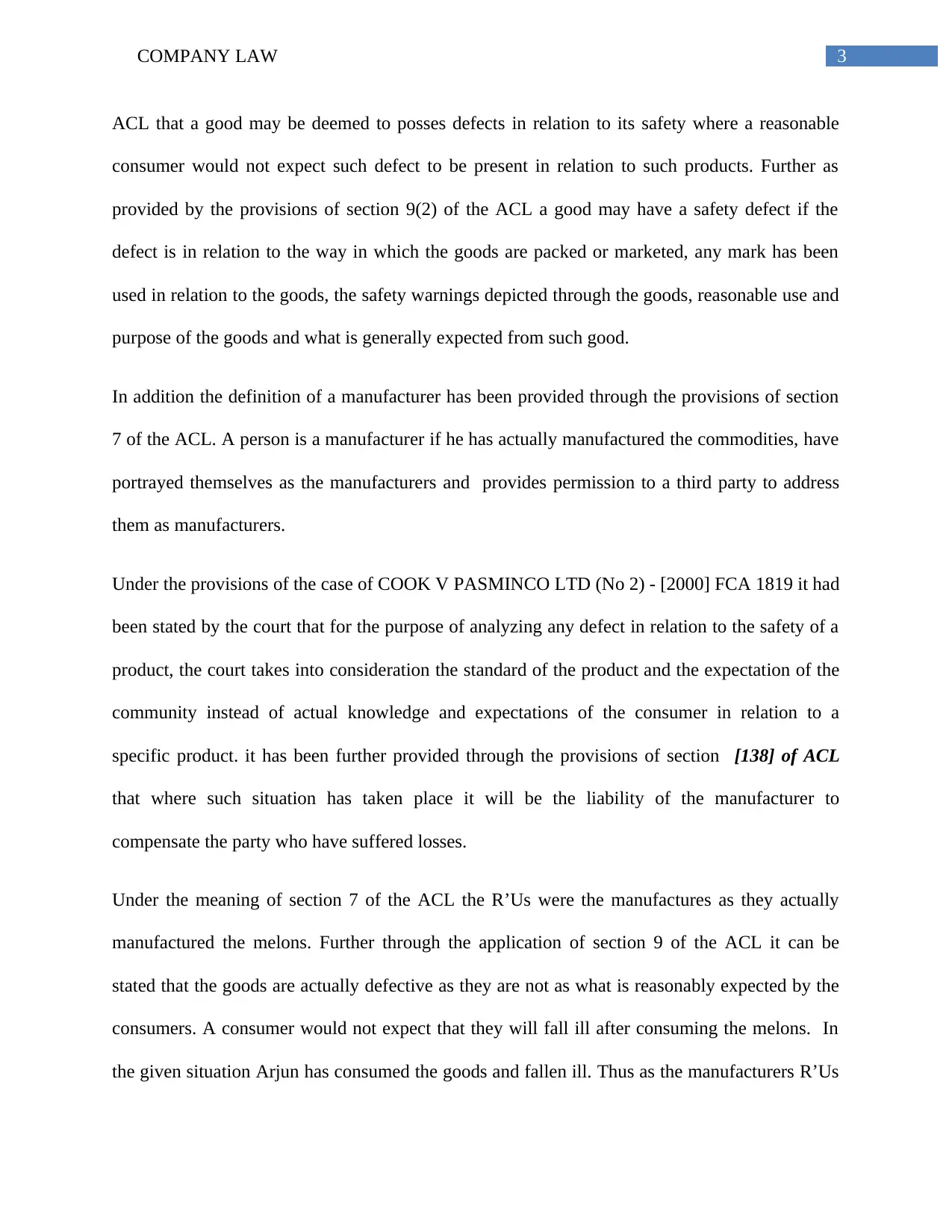
3COMPANY LAW
ACL that a good may be deemed to posses defects in relation to its safety where a reasonable
consumer would not expect such defect to be present in relation to such products. Further as
provided by the provisions of section 9(2) of the ACL a good may have a safety defect if the
defect is in relation to the way in which the goods are packed or marketed, any mark has been
used in relation to the goods, the safety warnings depicted through the goods, reasonable use and
purpose of the goods and what is generally expected from such good.
In addition the definition of a manufacturer has been provided through the provisions of section
7 of the ACL. A person is a manufacturer if he has actually manufactured the commodities, have
portrayed themselves as the manufacturers and provides permission to a third party to address
them as manufacturers.
Under the provisions of the case of COOK V PASMINCO LTD (No 2) - [2000] FCA 1819 it had
been stated by the court that for the purpose of analyzing any defect in relation to the safety of a
product, the court takes into consideration the standard of the product and the expectation of the
community instead of actual knowledge and expectations of the consumer in relation to a
specific product. it has been further provided through the provisions of section [138] of ACL
that where such situation has taken place it will be the liability of the manufacturer to
compensate the party who have suffered losses.
Under the meaning of section 7 of the ACL the R’Us were the manufactures as they actually
manufactured the melons. Further through the application of section 9 of the ACL it can be
stated that the goods are actually defective as they are not as what is reasonably expected by the
consumers. A consumer would not expect that they will fall ill after consuming the melons. In
the given situation Arjun has consumed the goods and fallen ill. Thus as the manufacturers R’Us
ACL that a good may be deemed to posses defects in relation to its safety where a reasonable
consumer would not expect such defect to be present in relation to such products. Further as
provided by the provisions of section 9(2) of the ACL a good may have a safety defect if the
defect is in relation to the way in which the goods are packed or marketed, any mark has been
used in relation to the goods, the safety warnings depicted through the goods, reasonable use and
purpose of the goods and what is generally expected from such good.
In addition the definition of a manufacturer has been provided through the provisions of section
7 of the ACL. A person is a manufacturer if he has actually manufactured the commodities, have
portrayed themselves as the manufacturers and provides permission to a third party to address
them as manufacturers.
Under the provisions of the case of COOK V PASMINCO LTD (No 2) - [2000] FCA 1819 it had
been stated by the court that for the purpose of analyzing any defect in relation to the safety of a
product, the court takes into consideration the standard of the product and the expectation of the
community instead of actual knowledge and expectations of the consumer in relation to a
specific product. it has been further provided through the provisions of section [138] of ACL
that where such situation has taken place it will be the liability of the manufacturer to
compensate the party who have suffered losses.
Under the meaning of section 7 of the ACL the R’Us were the manufactures as they actually
manufactured the melons. Further through the application of section 9 of the ACL it can be
stated that the goods are actually defective as they are not as what is reasonably expected by the
consumers. A consumer would not expect that they will fall ill after consuming the melons. In
the given situation Arjun has consumed the goods and fallen ill. Thus as the manufacturers R’Us
Paraphrase This Document
Need a fresh take? Get an instant paraphrase of this document with our AI Paraphraser
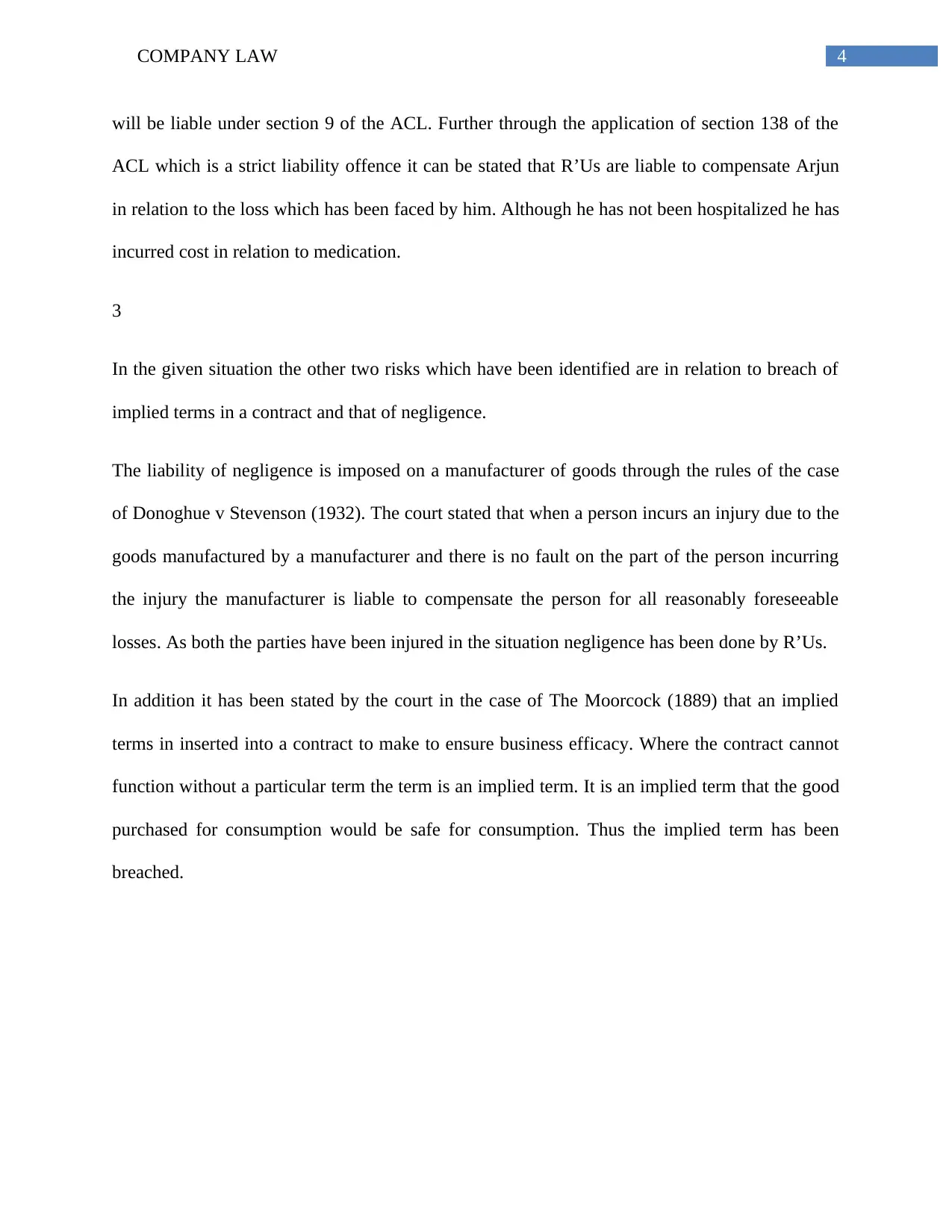
4COMPANY LAW
will be liable under section 9 of the ACL. Further through the application of section 138 of the
ACL which is a strict liability offence it can be stated that R’Us are liable to compensate Arjun
in relation to the loss which has been faced by him. Although he has not been hospitalized he has
incurred cost in relation to medication.
3
In the given situation the other two risks which have been identified are in relation to breach of
implied terms in a contract and that of negligence.
The liability of negligence is imposed on a manufacturer of goods through the rules of the case
of Donoghue v Stevenson (1932). The court stated that when a person incurs an injury due to the
goods manufactured by a manufacturer and there is no fault on the part of the person incurring
the injury the manufacturer is liable to compensate the person for all reasonably foreseeable
losses. As both the parties have been injured in the situation negligence has been done by R’Us.
In addition it has been stated by the court in the case of The Moorcock (1889) that an implied
terms in inserted into a contract to make to ensure business efficacy. Where the contract cannot
function without a particular term the term is an implied term. It is an implied term that the good
purchased for consumption would be safe for consumption. Thus the implied term has been
breached.
will be liable under section 9 of the ACL. Further through the application of section 138 of the
ACL which is a strict liability offence it can be stated that R’Us are liable to compensate Arjun
in relation to the loss which has been faced by him. Although he has not been hospitalized he has
incurred cost in relation to medication.
3
In the given situation the other two risks which have been identified are in relation to breach of
implied terms in a contract and that of negligence.
The liability of negligence is imposed on a manufacturer of goods through the rules of the case
of Donoghue v Stevenson (1932). The court stated that when a person incurs an injury due to the
goods manufactured by a manufacturer and there is no fault on the part of the person incurring
the injury the manufacturer is liable to compensate the person for all reasonably foreseeable
losses. As both the parties have been injured in the situation negligence has been done by R’Us.
In addition it has been stated by the court in the case of The Moorcock (1889) that an implied
terms in inserted into a contract to make to ensure business efficacy. Where the contract cannot
function without a particular term the term is an implied term. It is an implied term that the good
purchased for consumption would be safe for consumption. Thus the implied term has been
breached.
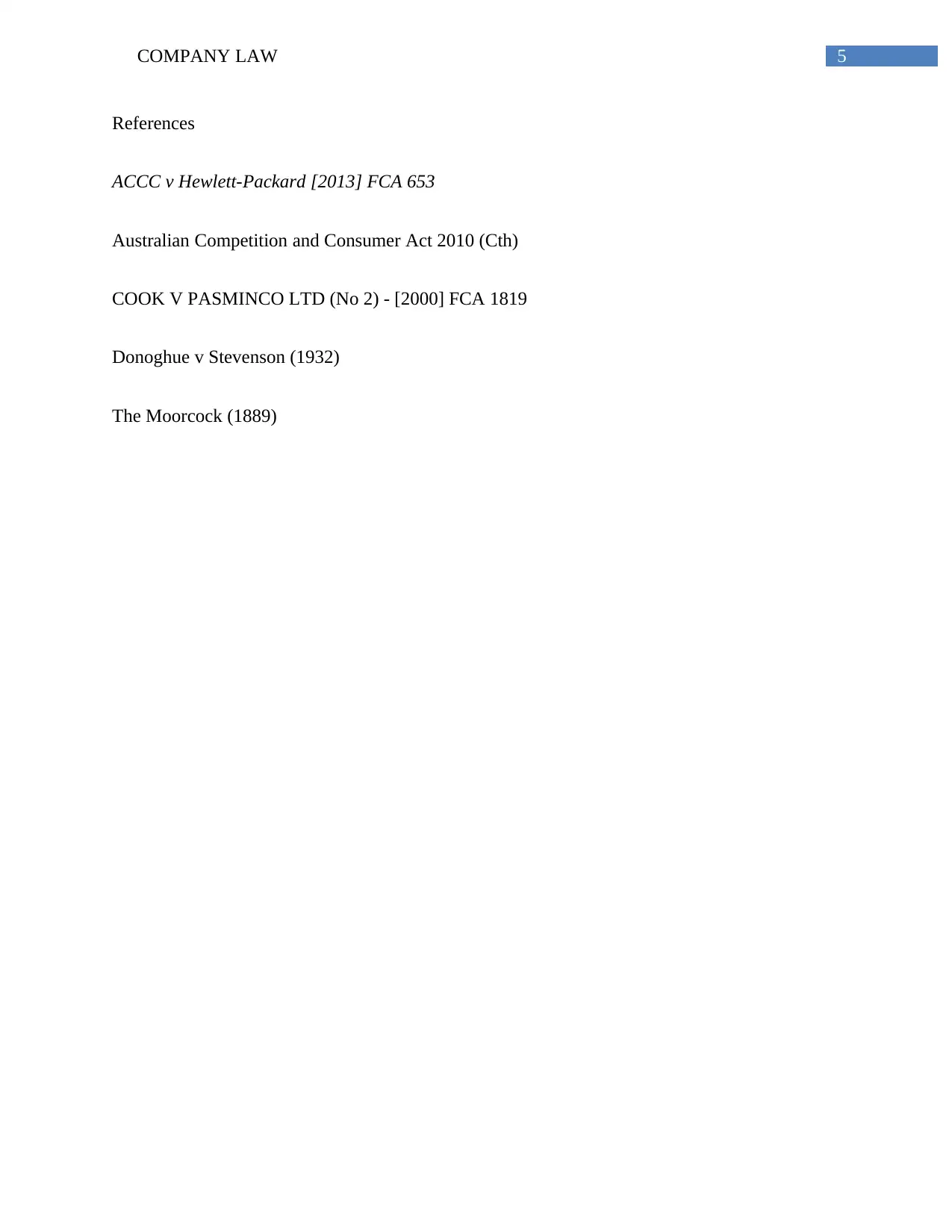
5COMPANY LAW
References
ACCC v Hewlett-Packard [2013] FCA 653
Australian Competition and Consumer Act 2010 (Cth)
COOK V PASMINCO LTD (No 2) - [2000] FCA 1819
Donoghue v Stevenson (1932)
The Moorcock (1889)
References
ACCC v Hewlett-Packard [2013] FCA 653
Australian Competition and Consumer Act 2010 (Cth)
COOK V PASMINCO LTD (No 2) - [2000] FCA 1819
Donoghue v Stevenson (1932)
The Moorcock (1889)
⊘ This is a preview!⊘
Do you want full access?
Subscribe today to unlock all pages.

Trusted by 1+ million students worldwide
1 out of 6
Related Documents
Your All-in-One AI-Powered Toolkit for Academic Success.
+13062052269
info@desklib.com
Available 24*7 on WhatsApp / Email
![[object Object]](/_next/static/media/star-bottom.7253800d.svg)
Unlock your academic potential
Copyright © 2020–2026 A2Z Services. All Rights Reserved. Developed and managed by ZUCOL.




